- Home
- Joseph Campbell
The Power of Myth Page 2
The Power of Myth Read online
Page 2
“Jesus had the eye,” he said. “What a magnificent reality he saw in the mustard seed.” He would quote the words of Jesus from the gospel of John—“Truly, truly, I say unto you, unless a grain of wheat falls into the earth and dies, it remains alone; but if it dies, it bears much fruit”—and in the next breath, the Koran: “Do you think that you shall enter the Garden of Bliss without such trials as came to those who passed away before you?” He roamed this vast literature of the spirit, even translating the Hindu scriptures from Sanskrit, and continued to collect more recent stories which he added to the wisdom of the ancients. One story he especially liked told of the trouble woman who came to the Indian saint and sage Ramakrishna, saying, “O Master, I do not find that I love God.” And he asked, “Is there nothing, then, that you love?” To this she answered, “My little nephew.” And he said to her, “There is your love and service to God, in your love and service to that child.”
“And there,” said Campbell, “is the high message of religion: ‘Inasmuch as ye have done it unto one of the least of these …’ ”
A spiritual man, he found in the literature of faith those principles common to the human spirit. But they had to be liberated from tribal lien, or the religions of the world would remain—as in the Middle East and Northern Ireland today—the source of disdain and aggression. The images of God are many, he said, calling them “the masks of eternity” that both cover and reveal “the Face of Glory.” He wanted to know what it means that God assumes such different masks in different cultures, yet how it is that comparable stories can be found in these divergent traditions—stories of creation, of virgin births, incarnations, death and resurrection, second comings, and judgment days. He liked the insight of the Hindu scripture: “Truth is one; the sages call it by many names.” All our names and images for God are masks, he said, signifying the ultimate reality that by definition transcends language and art. A myth is a mask of God, too—a metaphor for what lies behind the visible world. However the mystic traditions differ, he said, they are in accord in calling us to a deeper awareness of the very act of living itself. The unpardonable sin, in Campbell’s book, was the sin of inadvertence, of not being alert, not quite awake.
I never met anyone who could better tell a story. Listening to him talk of primal societies, I was transported to the wide plains under the great dome of the open sky, or to the forest dense, beneath a canopy of trees, and I began to understand how the voices of the gods spoke from the wind and thunder, and the spirit of God flowed in every mountain stream, and the whole earth bloomed as a sacred place—the realm of mythic imagination. And I asked: Now that we moderns have stripped the earth of its mystery—have made, in Saul Bellow’s description, “a housecleaning of belief”—how are our imaginations to be nourished? By Hollywood and made-for-TV movies?
Campbell was no pessimist. He believed there is a “point of wisdom beyond the conflicts of illusion and truth by which lives can be put back together again.” Finding it is the “prime question of the time.” In his final years he was striving for a new synthesis of science and spirit. “The shift from a geocentric to a heliocentric world view,” he wrote after the astronauts touched the moon, “seemed to have removed man from the center—and the center seemed so important. Spiritually, however, the center is where sight is. Stand on a height and view the horizon. Stand on the moon and view the whole earth rising—even, by way of television, in your parlor.” The result is an unprecedented expansion of horizon, one that could well serve in our age, as the ancient mythologies did in theirs, to cleanse the doors of perception “to the wonder, at once terrible and fascinating, of ourselves and of the universe.” He argued that it is not science that has diminished human beings or divorced us from divinity. On the contrary, the new discoveries of science “rejoin us to the ancients” by enabling us to recognize in this whole universe “a reflection magnified of our own most inward nature; so that we are indeed its ears, its eyes, its thinking, and its speech—or, in theological terms, God’s ears, God’s eyes, God’s thinking, and God’s Word.” The last time I saw him I asked him if he still believed—as he once had written—“that we are at this moment participating in one of the very greatest leaps of the human spirit to a knowledge not only of outside nature but also of our own deep inward mystery.”
He thought a minute and answered, “The greatest ever.”
When I heard the news of his death, I tarried awhile in the copy he had given me of The Hero with a Thousand Faces. And I thought of the time I first discovered the world of the mythic hero. I had wandered into the little public library of the town where I grew up and, casually exploring the stacks, pulled down a book that opened wonders to me: Prometheus, stealing fire from the gods for the sake of the human race; Jason, braving the dragon to seize the Golden Fleece; the Knights of the Round Table, pursuing the Holy Grail. But not until I met Joseph Campbell did I understand that the Westerns I saw at the Saturday matinees had borrowed freely from those ancient tales. And that the stories we learned in Sunday school corresponded with those of other cultures that recognized the soul’s high adventure, the quest of mortals to grasp the reality of God. He helped me to see the connections, to understand how the pieces fit, and not merely to fear less but to welcome what he described as “a mighty multicultural future.”
He was, of course, criticized for dwelling on the psychological interpretation of myth, for seeming to confine the contemporary role of myth to either an ideological or a therapeutic function. I am not competent to enter that debate, and leave it for others to wage. He never seemed bothered by the controversy. He just kept on teaching, opening others to a new way of seeing.
It was, above all, the authentic life he lived that instructs us. When he said that myths are clues to our deepest spiritual potential, able to lead us to delight, illumination, and even rapture, he spoke as one who had been to the places he was inviting others to visit.
What did draw me to him?
Wisdom, yes; he was very wise.
And learning; he did indeed “know the vast sweep of our panoramic past as few men have ever known it.”
But there was more.
A story’s the way to tell it. He was a man with a thousand stories. This was one of his favorites. In Japan for an international conference on religion, Campbell overheard another American delegate, a social philosopher from New York, say to a Shinto priest, “We’ve been now to a good many ceremonies and have seen quite a few of your shrines. But I don’t get your ideology. I don’t get your theology.” The Japanese paused as though in deep thought and then slowly shook his head. “I think we don’t have ideology,” he said. “We don’t have theology. We dance.”
And so did Joseph Campbell—to the music of the spheres.
—BILL MOYERS
I
MYTH AND
THE MODERN WORLD
People say that what we’re all seeking is a meaning for life. I don’t think that’s what we’re really seeking. I think that what we’re seeking is an experience of being alive, so that our life experiences on the purely physical plane will have resonances within our own innermost being and reality, so that we actually feel the rapture of being alive.
MOYERS: Why myths? Why should we care about myths? What do they have to do with my life?
CAMPBELL: My first response would be, “Go on, live your life, it’s a good life—you don’t need mythology.” I don’t believe in being interested in a subject just because it’s said to be important. I believe in being caught by it somehow or other. But you may find that, with a proper introduction, mythology will catch you. And so, what can it do for you if it does catch you?
One of our problems today is that we are not well acquainted with the literature of the spirit. We’re interested in the news of the day and the problems of the hour. It used to be that the university campus was a kind of hermetically sealed-off area where the news of the day did not impinge upon your attention to the inner life and to the magnificent human heri
tage we have in our great tradition—Plato, Confucius, the Buddha, Goethe, and others who speak of the eternal values that have to do with the centering of our lives. When you get to be older, and the concerns of the day have all been attended to, and you turn to the inner life—well, if you don’t know where it is or what it is, you’ll be sorry.
Greek and Latin and biblical literature used to be part of everyone’s education. Now, when these were dropped, a whole tradition of Occidental mythological information was lost. It used to be that these stories were in the minds of people. When the story is in your mind, then you see its relevance to something happening in your own life. It gives you perspective on what’s happening to you. With the loss of that, we’ve really lost something because we don’t have a comparable literature to take its place. These bits of information from ancient times, which have to do with the themes that have supported human life, built civilizations, and informed religions over the millennia, have to do with deep inner problems, inner mysteries, inner thresholds of passage, and if you don’t know what the guide-signs are along the way, you have to work it out yourself. But once this subject catches you, there is such a feeling, from one or another of these traditions, of information of a deep, rich, life-vivifying sort that you don’t want to give it up.
MOYERS: So we tell stories to try to come to terms with the world, to harmonize our lives with reality?
CAMPBELL: I think so, yes. Novels—great novels—can be wonderfully instructive. In my twenties and thirties and even on into my forties, James Joyce and Thomas Mann were my teachers. I read everything they wrote. Both were writing in terms of what might be called the mythological traditions. Take, for example, the story of Tonio, in Thomas Mann’s Tonio Kröger. Tonio’s father was a substantial businessman, a major citizen in his hometown. Little Tonio, however, had an artistic temperament, so he moved to Munich and joined a group of literary people who felt themselves above the mere money earners and family men.
So here is Tonio between two poles: his father, who was a good father, responsible and all of that, but who never did the thing he wanted to in all his life—and, on the other hand, the one who leaves his hometown and becomes a critic of that kind of life. But Tonio found that he really loved these hometown people. And although he thought himself a little superior in an intellectual way to them and could describe them with cutting words, his heart was nevertheless with them.
But when he left to live with the bohemians, he found that they were so disdainful of life that he couldn’t stay with them, either. So he left them, and wrote a letter back to someone in the group, saying, “I admire those cold, proud beings who adventure upon the paths of great and daemonic beauty and despise ‘mankind’; but I do not envy them. For if anything is capable of making a poet of a literary man, it is my hometown love of the human, the living and ordinary. All warmth derives from this love, all kindness and all humor. Indeed, to me it even seems that this must be that love of which it is written that one may ‘speak with the tongues of men and of angels,’ and yet, lacking love, be ‘as sounding brass or a tinkling cymbal.’ ”
And then he says, “The writer must be true to truth.” And that’s a killer, because the only way you can describe a human being truly is by describing his imperfections. The perfect human being is uninteresting—the Buddha who leaves the world, you know. It is the imperfections of life that are lovable. And when the writer sends a dart of the true word, it hurts. But it goes with love. This is what Mann called “erotic irony,” the love for that which you are killing with your cruel, analytical word.
MOYERS: I cherish that image: my hometown love, the feeling you get for that place, no matter how long you’ve been away or even if you never return. That was where you first discovered people. But why do you say you love people for their imperfections?
CAMPBELL: Aren’t children lovable because they’re falling down all the time and have little bodies with the heads too big? Didn’t Walt Disney know all about this when he did the seven dwarfs? And these funny little dogs that people have—they’re lovable because they’re so imperfect.
MOYERS: Perfection would be a bore, wouldn’t it?
CAMPBELL: It would have to be. It would be inhuman. The umbilical point, the humanity, the thing that makes you human and not supernatural and immortal—that’s what’s lovable. That is why some people have a very hard time loving God, because there’s no imperfection there. You can be in awe, but that would not be real love. It’s Christ on the cross that becomes lovable.
MOYERS: What do you mean?
CAMPBELL: Suffering. Suffering is imperfection, is it not?
MOYERS: The story of human suffering, striving, living—
CAMPBELL: —and youth coming to knowledge of itself, what it has to go through.
MOYERS: I came to understand from reading your books—The Masks of God or The Hero with a Thousand Faces, for example—that what human beings have in common is revealed in myths. Myths are stories of our search through the ages for truth, for meaning, for significance. We all need to tell our story and to understand our story. We all need to understand death and to cope with death, and we all need help in our passages from birth to life and then to death. We need for life to signify, to touch the eternal, to understand the mysterious, to find out who we are.
CAMPBELL: People say that what we’re all seeking is a meaning for life. I don’t think that’s what we’re really seeking. I think that what we’re seeking is an experience of being alive, so that our life experiences on the purely physical plane will have resonances within our own innermost being and reality, so that we actually feel the rapture of being alive. That’s what it’s all finally about, and that’s what these clues help us to find within ourselves.
MOYERS: Myths are clues?
CAMPBELL: Myths are clues to the spiritual potentialities of the human life.
MOYERS: What we’re capable of knowing and experiencing within?
CAMPBELL: Yes.
MOYERS: You changed the definition of a myth from the search for meaning to the experience of meaning.
CAMPBELL: Experience of life. The mind has to do with meaning. What’s the meaning of a flower? There’s a Zen story about a sermon of the Buddha in which he simply lifted a flower. There was only one man who gave him a sign with his eyes that he understood what was said. Now, the Buddha himself is called “the one thus come.” There’s no meaning. What’s the meaning of the universe? What’s the meaning of a flea? It’s just there. That’s it. And your own meaning is that you’re there. We’re so engaged in doing things to achieve purposes of outer value that we forget that the inner value, the rapture that is associated with being alive, is what it’s all about.
MOYERS: How do you get that experience?
CAMPBELL: Read myths. They teach you that you can turn inward, and you begin to get the message of the symbols. Read other people’s myths, not those of your own religion, because you tend to interpret your own religion in terms of facts—but if you read the other ones, you begin to get the message. Myth helps you to put your mind in touch with this experience of being alive. It tells you what the experience is. Marriage, for example. What is marriage? The myth tells you what it is. It’s the reunion of the separated duad. Originally you were one. You are now two in the world, but the recognition of the spiritual identity is what marriage is. It’s different from a love affair. It has nothing to do with that. It’s another mythological plane of experience. When people get married because they think it’s a long-time love affair, they’ll be divorced very soon, because all love affairs end in disappointment. But marriage is recognition of a spiritual identity. If we live a proper life, if our minds are on the right qualities in regarding the person of the opposite sex, we will find our proper male or female counterpart. But if we are distracted by certain sensuous interests, we’ll marry the wrong person. By marrying the right person, we reconstruct the image of the incarnate God, and that’s what marriage is.
MOYERS: The right perso
n? How does one choose the right person?
CAMPBELL: Your heart tells you. It ought to.
MOYERS: Your inner being.
CAMPBELL: That’s the mystery.
MOYERS: You recognize your other self.
CAMPBELL: Well, I don’t know, but there’s a flash that comes, and something in you knows that this is the one.
MOYERS: If marriage is this reunion of the self with the self, with the male or female grounding of ourselves, why is it that marriage is so precarious in our modern society?
CAMPBELL: Because it’s not regarded as a marriage. I would say that if the marriage isn’t a first priority in your life, you’re not married. The marriage means the two that are one, the two become one flesh. If the marriage lasts long enough, and if you are acquiescing constantly to it instead of to individual personal whim, you come to realize that that is true—the two really are one.
MOYERS: One not only biologically but spiritually.
CAMPBELL: Primarily spiritually. The biological is the distraction which may lead you to the wrong identification.
MOYERS: Then the necessary function of marriage, perpetuating ourselves in children, is not the primary one.
CAMPBELL: No, that’s really just the elementary aspect of marriage. There are two completely different stages of marriage. First is the youthful marriage following the wonderful impulse that nature has given us in the interplay of the sexes biologically in order to produce children. But there comes a time when the child graduates from the family and the couple is left. I’ve been amazed at the number of my friends who in their forties or fifties go apart. They have had a perfectly decent life together with the child, but they interpreted their union in terms of their relationship through the child. They did not interpret it in terms of their own personal relationship to each other.

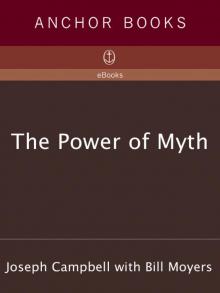 The Power of Myth
The Power of Myth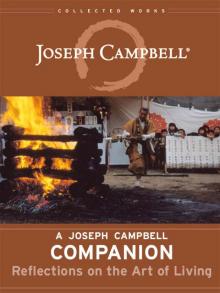 A Joseph Campbell Companion: Reflections on the Art of Living
A Joseph Campbell Companion: Reflections on the Art of Living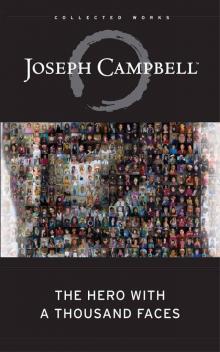 The Hero with a Thousand Faces
The Hero with a Thousand Faces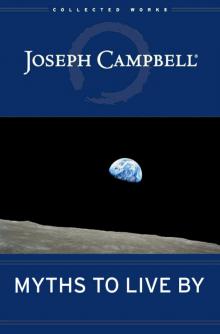 Myths to Live By
Myths to Live By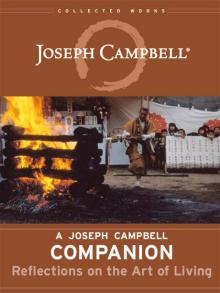 A Joseph Campbell Companion: Reflections on the Art of Living (Collected Works of Joseph Campbell)
A Joseph Campbell Companion: Reflections on the Art of Living (Collected Works of Joseph Campbell)